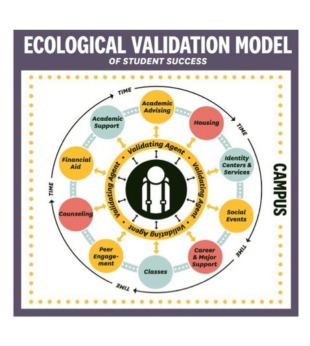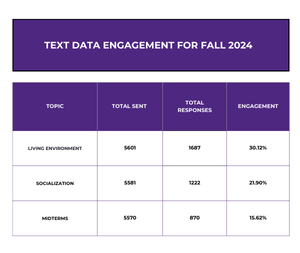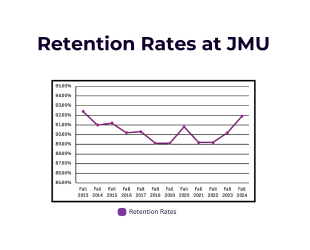Keeping the Pulse on Student Needs
News

Student Success Analytics (SSA) focuses on recognizing and closing equity-based retention gaps and improving overall retention rates at James Madison University. SSA uses data and technology to examine student success here on campus. Do not be fooled by the word “data.” Data is more than just numerical statistics. It can also be surveys and questionnaires. Student Success Analytics uses this to their advantage. They create email and text campaigns for a multitude of students. Based on an analysis of institutional data and various focus groups, these campaigns focus on four primary factors to improve student retention: well-being, sense of belonging, academics, and basic needs. Through their work, SSA strives to create campaigns that are data-driven, proactive, asset-based, and coordinated to provide support and resources to students.
Student Success Systems Coordinator Regina Wine-Nash oversees SSA’s text and email campaigns. Regina grew up in the Shenandoah Valley, earned an undergraduate degree in psychology from Bridgewater College and earned two master’s degrees from Mary Baldwin University, one in special education and another in higher education. Her previous experience includes working at Wilson Workforce and Rehabilitation Center, a facility that offers vocational education to adults with disabilities, where she taught them basic work skills such as conflict resolution and communication. Regina also worked at Bridgewater College in the office of Academic Support and Disability Services, where she supported students who struggled academically as well as assisted students with housing and academic accommodations. After her time at Bridgewater, she made the switch to JMU where her main role is campaign development and case management. With the Quality Enhancement Plan (QEP) as a guide, the goal is to create a data-informed, proactive system that targets student segments for intervention. Regina’s work is committed to reflecting and acting on how systems are succeeding and falling short in support of student success. Kayleigh Terry reached out to Regina to learn more about these campaigns and what they offer students.


 Terry: How successful are email campaigns in increasing retention rates at JMU?
Terry: How successful are email campaigns in increasing retention rates at JMU?